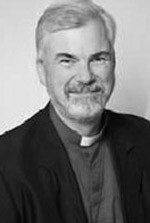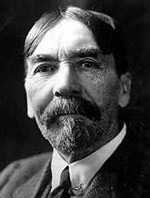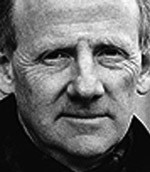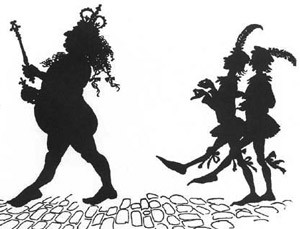The study of law is rather like the study of theology ... Waffly concepts abound – like “judicial independence” ... Tulkinghorn argues that law schools have about as much place in a modern university as schools of fencing or dancing
 Now look here young Parkes: it's the law for youBefore Anglican bishop John Parkes of Wangaratta moved there from Brisbane, he outlined the career advice given to him by his school careers master (August 27, 2006 Sunday Mail, Brisbane):
Now look here young Parkes: it's the law for youBefore Anglican bishop John Parkes of Wangaratta moved there from Brisbane, he outlined the career advice given to him by his school careers master (August 27, 2006 Sunday Mail, Brisbane):
“Now look here, young Parkes, you’re not good at science, are you? That means medicine’s out, and I see you got 100 lines for lack of reverence in the school chapel, so the church is out – so it’s the law for you.”
Parkes worked as a barrister and solicitor before switching to the church.
The study of “law” is not very scientific and it is doubtful whether the study of “law” (or theology for that matter) belongs in a university.
It is merely the study of aspects of language, political studies, philosophy, sociology, psychology, history, arts, economics and quite a few other things besides.
Interestingly, Flinders University has lumped law with education, humanities and theology.
All rather waffly stuff.
Roddy Meagher was dismissive in 1983 of much academic legal expertise when he said:
“There are, to be sure, multitudes of academic homunculi who scribble and prattle relentlessly about such non-subjects as criminology, bail, poverty, consumerism, computers and racism … they possess neither practical skills nor legal learning. They are failed sociologists.”
Historically, as Queensland law lecturer Paul O’Shea said:
“It was not always clear that law degrees, as we now know them, should be offered by universities at all… The training of solicitors was conducted by the profession itself along the lines of a guild style apprenticeship… Barristers also rarely studied law at university.”
 VeblenNowadays, however, no one who wants to get anywhere in the law would dream of saying: (as Thorstein Veblen did in 1918 – see footnote 303).
VeblenNowadays, however, no one who wants to get anywhere in the law would dream of saying: (as Thorstein Veblen did in 1918 – see footnote 303).
“The law school belongs in a modern university no more than a school of fencing or dancing.”
In 1999 Vivienne Brand (a lecturer at Flinders Uni) wrote:
“Law as a discipline struggles as much as, or perhaps more than, any other discipline in its attempts to reconcile its close historic connections to professional practice with its current location in a university environment.”
Huge benefits flow to any claimed areas of expertise that can get themselves into a university curriculum.
The best way for non scientific disciplines to get in is to invent specialist language. The language doesn’t need to make a lot of sense and it is probably an advantage if it doesn’t.
 John Ralston Saul: rise of specialistsIn his book Voltaire’s Bastards, the Dictatorship of Reason in the West, the philosopher John Ralston Saul discusses the rise of “specialists”:
John Ralston Saul: rise of specialistsIn his book Voltaire’s Bastards, the Dictatorship of Reason in the West, the philosopher John Ralston Saul discusses the rise of “specialists”:
“One of the specialist’s most successful discoveries was that he could easily defend his territory by the simple development of a specialised language incomprehensible to non experts”. [Or incomprehensible to experts in other disciplines.]
“The dialects of political science and sociology … are increasingly incomprehensible to each other, even though they are examining identical areas. It is doubtful whether they have any separate existence one from the other. In fact, it is doubtful whether either of them exists at all as a real subject of expertise.”
Even within a specialist group one expert will sometimes be incomprehensible to others, but it is vital for the survival of the group that this is not pointed out to non-experts.
 All of the experts and acolytes must conspire to “see” the emperor’s new clothes.
All of the experts and acolytes must conspire to “see” the emperor’s new clothes.
Late last month the Empress of the Victorian Supreme Court gave an oration on “judicial independence” at Melbourne University.
This is a very popular topic among judges because it supports the proposition that judges can do what they like, free from pesky interference.
No one can pin the entirety of the concept down, and it combines well with other important but waffly concepts like “rule of law” and “professional independence”. She said:
“I will try to address the topic so that it may be better understood by the community. Necessarily, my observations will not be addressed to the judiciary or academia.”
What followed was a marketing exercise that eventually repositioned “judicial independence” a bit closer to the laity in terms of judges defending the citizenry against tyranny. In the concluding lines of her oration the Victorian CJ said:
“When the knock comes on the door late at night, when you are arrested and placed in custody … it is the independent judiciary to whom you may turn.”
That is very comforting, and was no doubt meant to be, but the pages of legal history are rather light on judges valiantly standing up to oppressive regimes, at personal risk to themselves, to defend a citizen.
It was juries or parliaments or MPs or newspapers who did that sort of thing.
If judges opposed the executive at personal risk to themselves, it seems it was usually for religious or political reasons, not from a desire to protect ordinary citizens.
In an essay entitled “Is Judicial Independence a Useful Concept?” which forms chapter 3 of a book entitled Judicial Independence at the Crossroads
 Prof Kornhauser's officeProfessor Lewis Kornhauser of the New York University School of Law says:
Prof Kornhauser's officeProfessor Lewis Kornhauser of the New York University School of Law says:
“The confusion over the meaning of judicial independence cannot be eliminated … judicial independence is not a useful analytic concept. It does not promote either our understanding of how courts function or the design of desirable judicial institutions.”
In September 2008 Professor Peerenboom, of La Trobe University, did not go as far as Professor Kornhauser but he did identify five forms of judicial independence and said that:
“Contrary to common (mis)understanding, there is no single model of judicial independence.”
At times it was not entirely clear to which model the Empress was referring.
In a speech in February NSW Chief Justice Spigelman adopted the views of Chief Justice French who, “emphasised that the independence of the legal profession is a corollary of independence of the judiciary”.
Spiggsie went on to say:
“The unthinking application to the legal profession” [of the] consumer/service provider model of economic activity … could have serious consequences for the rule of law in this country, unless the centrality of independence of the profession is kept firmly in mind throughout the process.”
It is marvellous where legal (as opposed to scientific) reasoning processes can lead.
I think Spiggsie means that legal consumers must not be given too many rights against their lawyers, or else the rule of law will go flying out the window.